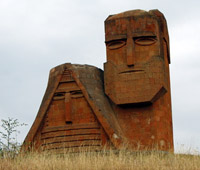People in Armenia speak a lot about Nagorno Karabakh. But they speak about this issue mainly in two situations; either during any incidents at the border line or if there is any news about the conflict settlement negotiations.
Even now, when presidential campaign is going on in Karabakh, very little information comes to Armenia and people do not know much about the processes happening there. In Armenia few people know what is happening in Karabakh behind official statements and borders. Here people like to repeat all the time that for two decades Karabakh has been independent. This means that the country should have its own inner life; economic, political, social, etc.
We are more or less informed about the political life in Karabakh, but the information base concerning other sectors is a vacuum. For example, is there any journalist or expert giving interviews from time to time who knows the economic growth rate in Karabakh since 2009? Since that time we are speaking of crisis but nobody is speaking about the situation in that country with 145,000 citizens and whether the crisis has changed anything there.
Recently the statistics service of Armenia published macroeconomic indices for January-May. The report writes that there has been 7.4% growth of the economic activity rate (EAR). In January-March this indicator was 6.1%. This indicator impressed many people in Armenia. For example, in Nagorno Karabakh Republic the GDP growth rate was 8.4% in January-March, but people here do not know about this and do not want to discuss it either. Certainly the EAR and GDP growth rate are methodically different indices, but in fact can be compared because both are describing economic growth processes.
In order to compare and use both of these indices, we can observe the indices of the previous years. Based on the chart made on those indices we can see that during the recent years Karabakh is doing a better job in GDP growth rate than Armenia. It is noteworthy that during the 2009 crisis, when Armenia had a double-digit slump (14.4%), NKR had 13.1% economic growth.
The GDP per capita has grown by 84%, reaching AMD936.1k instead of AMD510.0k in 2007. Till 2009 the production sector was forgotten in Armenia and the main focus was on the sector of construction. It was the vice versa in Karabakh as in 2006-2011 the production sector grew at an average annual rate of 11%. For example, in 2009 the production growth in Karabakh was 16%.
The reason of the above said is not finding differences and strengths or weaknesses. Shortcomings always can be found. Even the authorities don’t speak about the success during their election campaigns. Twenty-seven minutes out of thirty minutes in their speeches are dedicated to the solution of existing problems. Certainly there must be faster growth in order to provide a rapid and good economic development in Karabakh. However, the main privilege in Karabakh is the realistic look at everything. There are no exaggerated projects and discussions about things that have weird and long names and cannot be achieved. For example, people don’t speak about making Hadrut a regional financial center. They don’t speak about developing the IT sector or formation of civic society. Instead of that they say that the country will continue being agrarian and agriculture will be the main focus of economic development (instead of announcing about 12 priority sectors). In parallel with this, they also provide a free Wi-Fi network in the central part of Stepanakert.
Certainly there are differences between the platforms of candidates and oppositionists are more focused on the IT sector, but the fact and positive thing is that they are not giving unrealistic promises such as availability of apartments. Even it is the vice versa; they openly announce that at this point the government is not able to provide people with apartments. Instead of this, they promise to create new jobs and stretch the mortgage credit coverage period to 25 years so that people can work and have apartments.
The point of this article is that when writing about Karabakh, we could sometimes look behind the border incidents and negotiations and write about other things as well and think about the people that live there. Usually all candidates for elections in Armenia speak about their understanding of the conflict resolution. Journalists are sensitive to that issue as well, but their interests do not go behind border incidents and negotiations. However, in Karabakh during pre-election campaigns (especially in remote regions) people don’t ask questions about negotiations. The explanation of this fact is very simple – for these people the problem has been solved as they are living on their land. In order to keep people on their land it is more important to solve other problems they have with water, jobs, etc. When the social and economic background is strong, the immunity of the state is strong as well. However, none of the politicians of Armenia is speaking of economic development and recommendations concerning related important issues in Karabakh. This is ignorance.

